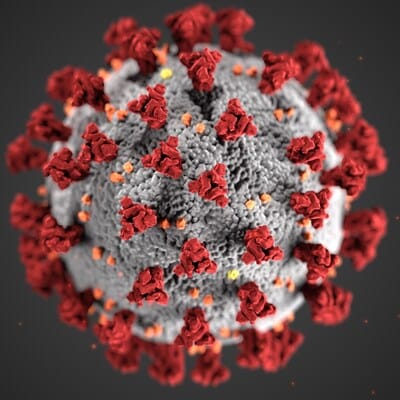Changes in the spike protein increased the coronavirus’ ability to infect the brain.
Changes in the spike protein increased the coronavirus’ ability to infect the brain, which could underlie brain-related symptoms of the disease, including brain fog from long Covid, a new study finds.
The spike protein tells the virus, SARS-CoV-2, how to enter human cells before infecting them with Covid-19.
The exact causes of long Covid, which persists for months after the initial infection, and its symptoms affecting the brain are still unknown and are being widely studied around the world.
The study could therefore help scientists better understand these aspects and could lead to specific treatments to protect and eliminate the virus from the brain, according to researchers from Northwestern University, UK, and the University of Illinois-Chicago, USA.
For the study, published in the journal Nature Microbiology, researchers infected mice with the coronavirus. As the virus multiplied inside the host, the researchers compared the spike proteins of the viruses in the brain to those in the lungs.
Mice are often studied because they are biologically similar to humans.
The researchers found that in the lungs, the spike protein was very similar to that of the virus used to infect the mice. However, in the brain, the spike proteins of most of the viruses were found to have a deletion or mutation in the region critical for entering human cells.
“By looking at the genomes of viruses found in the brain compared to those in the lungs, we found that viruses with a specific deletion in the spike protein were much better at infecting the brains of these animals,” said Judd Hultquist, associate professor of medicine (infectious diseases) at Northwestern University and corresponding author on the study.
Furthermore, when viruses with the mutated spike protein traveled to the lungs of mice, they were found to be weakened.
The researchers suggested that these viruses might be better able to infect cells in the brain and central nervous system.
The authors also believe that the spike protein is a “critical regulator that determines whether or not the virus enters the brain.”
The findings could have major implications for the treatment and management of neurological symptoms reported by Covid-19 patients, Hultquist said.
“If (long Covid) is caused by an infection of cells in the central nervous system, our study suggests there may be specific treatments that might work better than others to clear the virus from this compartment,” he said.
(Only the headline and image of this report may have been reworked by Business Standard staff; the rest of the content is auto-generated from a syndicated feed.)
First published: August 26, 2024 | 14:46 IS
Disclaimer:
The information contained in this post is for general information purposes only. We make no representations or warranties of any kind, express or implied, about the completeness, accuracy, reliability, suitability or availability with respect to the website or the information, products, services, or related graphics contained on the post for any purpose.
We respect the intellectual property rights of content creators. If you are the owner of any material featured on our website and have concerns about its use, please contact us. We are committed to addressing any copyright issues promptly and will remove any material within 2 days of receiving a request from the rightful owner.

